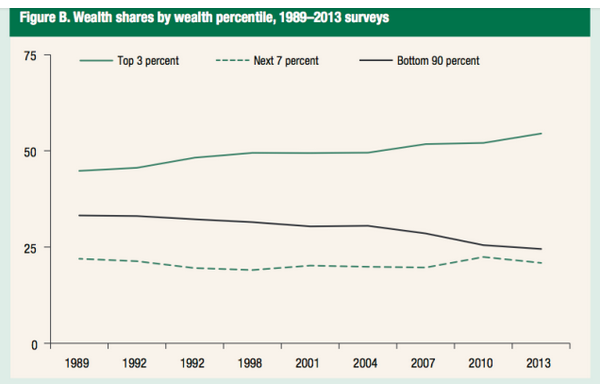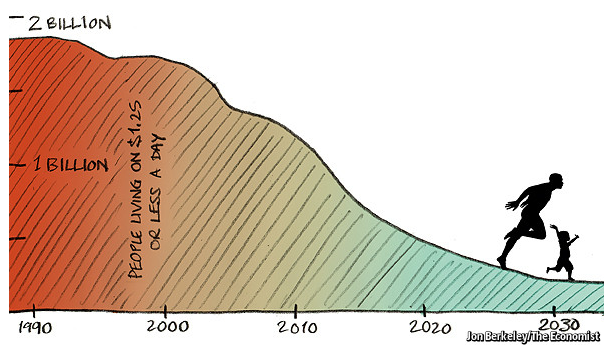The view of Adam Smith about the assertion that the rich are getting richer and the poor poorer
The rich are getting richer and the poor are getting poorer. The reason is that they have the capabilities, resources, and capital to get the best from the workforce who are usually the poor. This paper summaries different classical and contemporary viewpoints on the subject.
Smith, in his book Wealth of Nations (1776), has asserted that the performance and wealth of a certain individual depends on how the person performs regardless of the specific industry he may be working.
He asserted that this is the primary reason which explains why the gap between poor and reach is widening. Due to advancement and economies of scale, the production system and production process has developed. All the groups of the society (from labourer to landlords) are gaining the benefits.
According to Smith (1776), the manufacturers of the world tend to produce the products in such countries where the products can be produced at least possible costs. As a result labour intensive production activities are flowing to developing countries such as Thailand, India, and Vietnam etc.
On the other hand the conceptual and high thought activities are being processed in the developed countries. The labours at the developing countries are getting more wages and benefits than the previous periods.
On the other hand the developed countries (in this case the investors) are selling the products although at cheaper prices. But the profit margins are much higher than the periods when products were products in home countries.
Smith (1776) also said that this is the factor that primarily explains why the gap between poor and rich is widening.
But it is paradoxical that why the labours at the developing countries and the communities are getting poorer if they get higher salaries and benefits then the periods when the foreigners wouldn’t produce at the host country.
It is logical that the poor labours and communities at the developing countries are getting more wages. Therefore, their financial position should have been advancing, but their financial position is deteriorating.
There is some other factors that make their position poorer. Considering above, the title may need to be adapted to “The richer are getting rich and the poorer are making less improvement”.
Opinions of Andrew Carnegie about the assertion- the rich are getting richer and the poor poorer?
Carnegie (1889) has said that the main reason for widening gap between poor and rich is the problem in wealth management. If the wealth is distributed in proper way, there would be little difference among them.
With the passes of time, production, efficiency and population started increasing.
The difference between the poor and rich also started increasing. In the past, according to Carnegie (1889), there was little difference between the employers and the employees because there was little production, fewer people and less efficiency.
But with the passes of time, production technology becomes efficient, people become expert, population grows. These factors lead to higher production with higher level of efficiency in terms of costs and wastages.
The higher volume is another factor for efficiency. As a result the employees or the general communities are getting a little bit higher than the past periods. But the employers are gaining much more than the employees.
Another factor for increasing the difference is the automation of the production system, improvement in scientific technology. These factors have contributed to accelerated growth of production, efficiency and profits.
In this competitive age, those groups gain the most who are the fittest in the society.
As the employers are gaining much more than the employees and general people in the society, there is increasing gap between the two. But the discussion observed here does not match with the title of this essay that the rich are getting richer and the poor poorer. In the above case although the richer are getting richer, but the poor are not getting poorer, rather their financial position is improving day by day.
Finally, Carnegie (1889) recommended that the widening gap between the poor and the rich can be shortened if the rich people emphasizes on competency rather than acquisition of wealth.
Other sources:
CBC News reported that political and ethical reasons of not addressing the growing gap is responsible for a widening gap between the poor and the rich.
This source also reported that the gap is increasing because the rich people are more interested to accumulate more resources utilizing the existing one. On the other hand the poor or the employees are getting the salaries as same as before.
Due to more efficient production system and employees, bulk production. Growing demand the business are growing, as a result the richer are getting richer. But this is questionable to say that the world’s poor are getting poor.
Economist opined that this would make more sense to say that the gap between the poor and the rich is growing. But the world’s poverty is improving, on an average.
But if a particular economy, for example USA, is considered, the implication is different. In such particular case the poor are getting poorer. Reason is that the higher production cost in such developed countries have raised the salaries. This resulted in shifting the manufacturing place.
Gawker said that in the US economy, the rich are getting richer and the poor are getting poorer. This source has illustrated the situation with a graph:

It has also been reported by the Forbs that the rich are staying richer and the poor poorer. The tax system of the country is organized in such a way that the employees and general people will find it difficult to acquire wealth. On the other hand, the rich business people will get richer.
The reasons why the American rich are getting rich and the poor are staying poor or becoming poorer have been explained by Porter and Rivikin through Harvard Business Review.
They explained that developed countries such as US have made free trade agreement with different blocks (such as NAFTA, KORUS with Korea).
The production cost in the US is generally high. Thus companies of US are sourcing in the low-cost countries such as China, Vietnam, India, and Bangladesh. As a result the people in the home countries are losing jobs and this loss impacts their financial condition negatively.
But if the world poverty is considered, then it will be seen that the world poverty is improving as explained by The Economist. The number of people living below extreme poverty line with income of $1.25/day has decreased to far less than 1 billion in 2014 from almost 1.8 billion in 2000. The graph is illustrated below:

But one fact is true that the wealth of the rich people is increasing then those of the poor.
The Guardian reported that 1% of the world’s population poses more than the wealth of other 99%.
On the other hand BBC reported that the wealthiest 1% of the world’s population own more than 48% world’s wealth and this rate was 44% in 2009.
This proves that the rich are getting richer, it is predicted that this rate may be 50% in 2016. But the wealth of poor is decreasing, on an average.
BBC also reported that the poorest 50% of the world lost $750 billion in the last 4 years.
From the above analysis, it is seen that although the extreme poverty line is improving, but on an average the poor are becoming poorer and the rich are becoming richer because a small increase in the poverty line does not have significant impact on overall result.
Conclusion:
There has been growing concern that the rich are becoming richer and the poor are getting poorer.
In the past, there was little difference between the employers and the employees because of the minimum scale of production and because those days didn’t experience globalization and economies of scale.
With the passes of time, employees become experienced, technologies become efficient and the world become integrated; these factors mutually influence the business and wealthy people to shift the production to developing countries. As a result the poor people of the developed countries become poorer and the poverty level of the employees at the developing countries reduces, but on average, the world’s poor become poorer.
Resources:
Carnegie, Andrew. Wealth. The North American Review (1990).
Smith, Adam. The Wealth of Nations (1776). Na, 1937

Appreciate this post. Let me try it out.